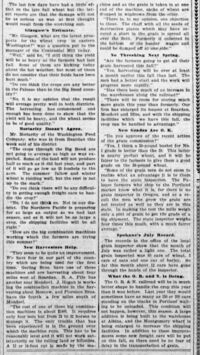1898-08-11-sc-p7-report-on-reardan-crop
August 11, 1898 Spokane Daily Chronicle Page 7:
The last few days have had a little effect on the late fall wheat but the latest reports are that the damage will not be as serious as was at first thought would result from the scorching sun.
Glasgow's Estimate.
“Mr. Glasgow, what are the latest prospects for the wheat crop in eastern Washington?” was a question put to the manager of the Centennial Mill today.
“Well,” said he, “I still think the yield will be as heavy as the farmers had last fall. Some of them are kicking today about the hot weather, but most of them do not consider that their fields have been hurt much.”
“Do you think the crops are any better in the Palouse than in the Big Bend country?"
“No, it is my opinion that the result will average pretty well in both districts. The harvesting has commenced and enough has been done to show that the yield will be heavy, and the wheat seems to be of good quality.”
Moriarity Doesn't Agree.
Mr. Moriarity of the Washington Feed Company, who was in from Reardan this week said of his district:
"The crops through the Big Bend are net going to average as high as was expected. Some of the land will not produce half as much as it did last year, and part of it will go as low as 15 bushels to the acre. The summer fallow and winter wheat is yielding well, but the rest is not up to the mark."
"Do you think there will be any difficulty in getting enough freight cars to handle the crop?" “No, I do not think so. Not in our district. The Northern Pacific is preparing for as large an output as we had last season, and as it will not be as large a crop, the shipping facilities will be all right.”
"How are the big combination machines working which the farmers are trying this summer?"
New Harvesters Help.
"They seem to be quite an improvement. We have four in our part of the country which are being used for the first time. Gerling Bros, have one of these machines and are harvesting about four miles west of Reardan. R. A. Fife has another near Mondovi. J. Hogan is working the combination machine in the harvesting about Moscow, and Florence Bros. have the fourth a few miles south of Mondovi.
“The cost of one of these big combination machines is, about $1800. It requires only four men but from 28 to 32 horses to manage it. The only trouble that has been experienced is in the ground over which the machine runs. This has to be reasonably level and it will not work satisfactorily on the rolling land or hillsides. A 12 or 14-foot cut is made by the machine and as the grain is taken in at one end of the machine, sacks of wheat are dropped in windrows from the other.
“There is, in my opinion, one objection to these. The chaff with all the seeds of destructive plants which may have secured a start in the grain is spread all over the field. Formerly it collected in the bottom of the header wagon and could be dumped off at one side.”’
No Threshing Next Spring.
“Are the farmers going to get all their grain harvested this fall?"
“Yes, harvesting will be over at least a month earlier this fall than last. The men had a better start and the work will progress more rapidly.”
“Has there been much of an increase in the warehouses along the railroad?”
“There will be room for storing much more grain this year than formerly. Our firm has enlarged its houses at Reardan, Mondovi and Hite, and with the shipping facilities which we have this fall, the crop can be handled to advantage."
New Grades Are O. K.
“Do you approve of the recent action of the grain commission?”
“Yes, I think a 58-pound bushel for No. 1 grade is better than the 59. This latter is nearly perfect wheat, and it will be fairer to the farmers to give them a good grade on the 58-pound wheat.
“Some of the grain men do not seem to realize what an advantage it is to them to have the state inspection. The Palouse farmers who ship to the Portland market know what it is, for there is no grain inspector in Oregon, and as a result the men who grow the grain are not treated as well as they are in this state. In making the test the mills weigh only a pint of grain to get the grade of a big shipment. The state inspector weighs four times this much, with a much fairer average.”
Spokane's July Record.
The records in the office of the local grain inspector show that the month of July was rather a light one. The total grain inspected was 80 cars of wheat, 5 cars of oats and one car of barley, So far this month about 12 cars have gone through the hands of the inspector.
What the O. R. and N, Is Doing.
The O. R. & N. railroad will be in much better shape to handle the crop this year than it was before. Last year they would sometimes have as many as 150 or 200 cars standing on the tracks in Portland waiting to be unloaded. This condition will not happen, however, this season. A large addition is being built to the warehouse at Albina, and the Montgomery wharf is being enlarged to increase the shipping facilities. In addition to these improvements some new freight cars will be put on this fall, so there need be no fear of delay in the transportation of grain.
